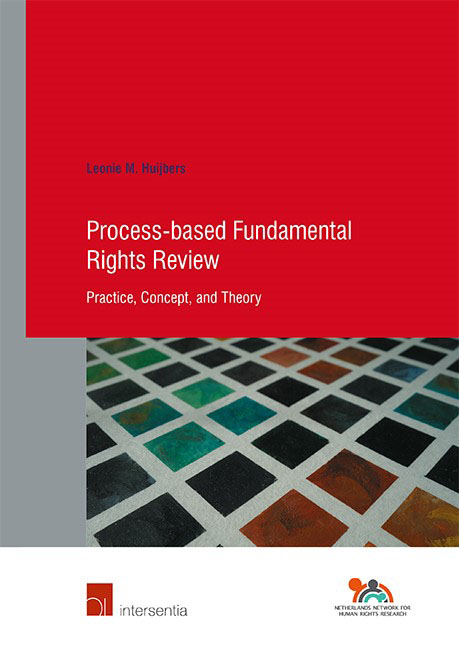Book contents
- Frontmatter
- Acknowledgments
- Contents
- List of Abbreviations
- INTRODUCTION
- PART I THE PRACTICE OF PROCESS-BASED FUNDAMENTAL RIGHTS REVIEW
- PART II THE CONCEPT OF PROCESS-BASED FUNDAMENTAL RIGHTS REVIEW
- PART III THE THEORY ON PROCESS-BASED FUNDAMENTAL RIGHTS REVIEW
- CONCLUSION
- Addendum: Questions for ECtHR Judges
- Summary
- Samenvatting
- Bibliography
- Official Documents
- Case-Law (by Jurisdiction)
- Case-Law (by Name)
- Curriculum vitae
- Human Rights Research Series
- Index
Reflection on Part I
Published online by Cambridge University Press: 11 November 2021
- Frontmatter
- Acknowledgments
- Contents
- List of Abbreviations
- INTRODUCTION
- PART I THE PRACTICE OF PROCESS-BASED FUNDAMENTAL RIGHTS REVIEW
- PART II THE CONCEPT OF PROCESS-BASED FUNDAMENTAL RIGHTS REVIEW
- PART III THE THEORY ON PROCESS-BASED FUNDAMENTAL RIGHTS REVIEW
- CONCLUSION
- Addendum: Questions for ECtHR Judges
- Summary
- Samenvatting
- Bibliography
- Official Documents
- Case-Law (by Jurisdiction)
- Case-Law (by Name)
- Curriculum vitae
- Human Rights Research Series
- Index
Summary
Part I of this book has discussed multiple examples of process-based review in fundamental rights cases. The judgments demonstrate that procedural reasoning has been and is being applied by courts to determine whether fundamental rights have been violated. Courts have turned to procedural reasoning concerning a wide variety of rights. Process-based fundamental rights review is not used only in relation to procedural rights, like the right to a fair trial (e.g., the two European Arrest Warrant cases) and the right to effective remedies (e.g., the amparo remedy), but also in relation to substantive rights, like the right to life (e.g., Carter). Courts have also applied process-based review to help them assess public authorities’ compliance with civil rights (e.g., the right to freedom of expression, Miss Behavin Ltd.), political rights (the right to political participation, e.g., Doctors for Life International), socioeconomic rights (the right to housing, e.g., I.D.G.), and cultural rights (the right to respect of the cultural lifestyle of Roma and travellers, Winterstein). Procedural reasoning has also been used to examine whether decision-making authorities have met their negative obligations, for example, whether they have refrained from biased decision-making (e.g., Baker), as well as their positive obligations, for instance, whether they have tried to strike a balance between the various interests and rights at stake (e.g., Von Hannover (No. 2) and Quila). In addition, the examples show that courts’ review of the quality of decision-making procedures varies in its focus. In certain cases, courts focused on evidence-based decision-making (e.g., Hartz IV) and on reason-giving for decisions (e.g., ‘Tunisian case’), whereas in other cases, they emphasised the need for deliberative and participation-oriented procedures (e.g., Carolene Products and Fullilove).
Additionally, it can be discerned that procedural reasoning is not just applied by international courts, such as the ECtHR and the ECJ, but also by national courts. Not only have highest national courts turned to procedural considerations, but this is also being done by lower courts, like the SCH, the UKCoA, the DCTH and the CoATH. The examples of procedural reasoning also show that courts have probed the quality of the decision-making process of judicial procedures and of administrative procedures. Review of the latter procedures relates both to general and individual decisions (compare Hatton and Baker), and both to decisions taken by executive authorities exercising State functions and to decisions of public schools and public hospitals (e.g., Denbigh High School and Lambert4).
- Type
- Chapter
- Information
- Process-based Fundamental Rights ReviewPractice, Concept, and Theory, pp. 83 - 86Publisher: IntersentiaPrint publication year: 2021



